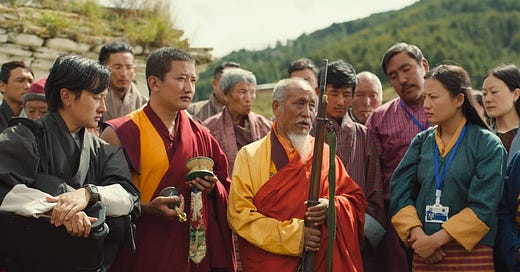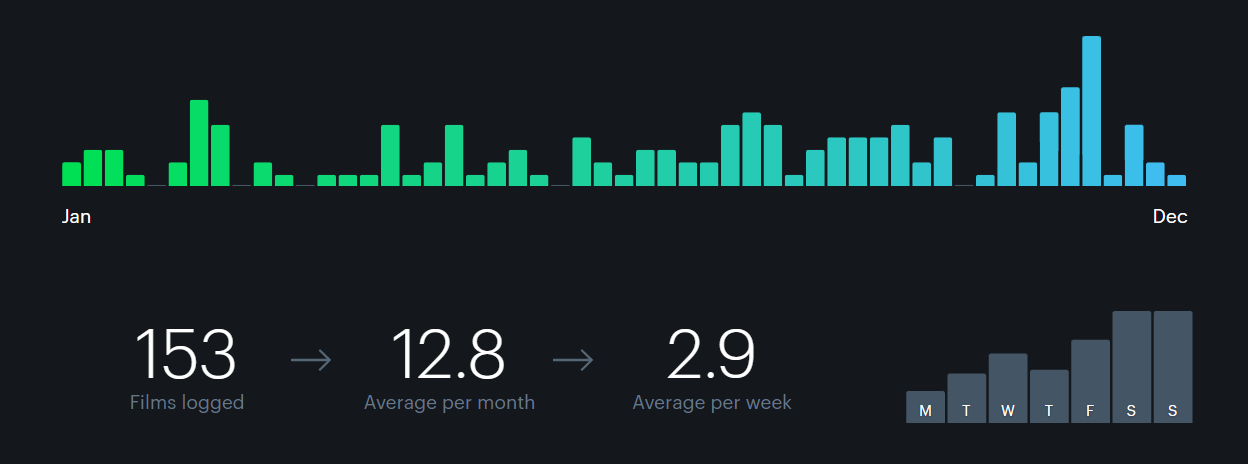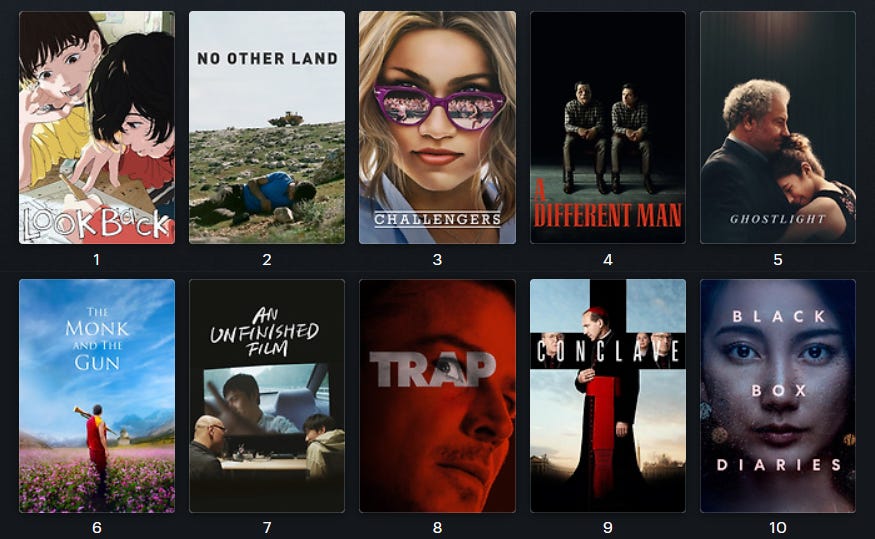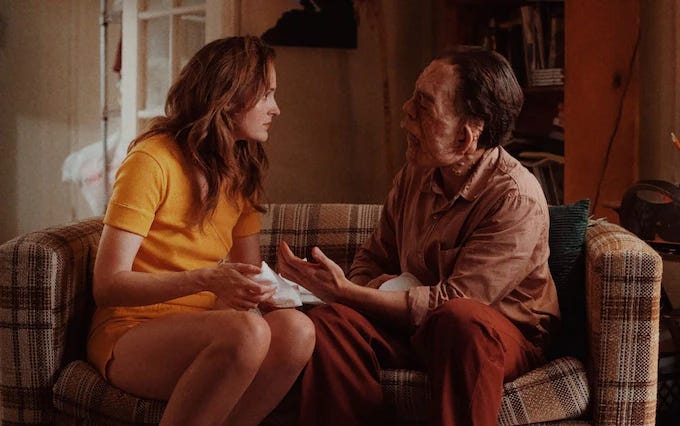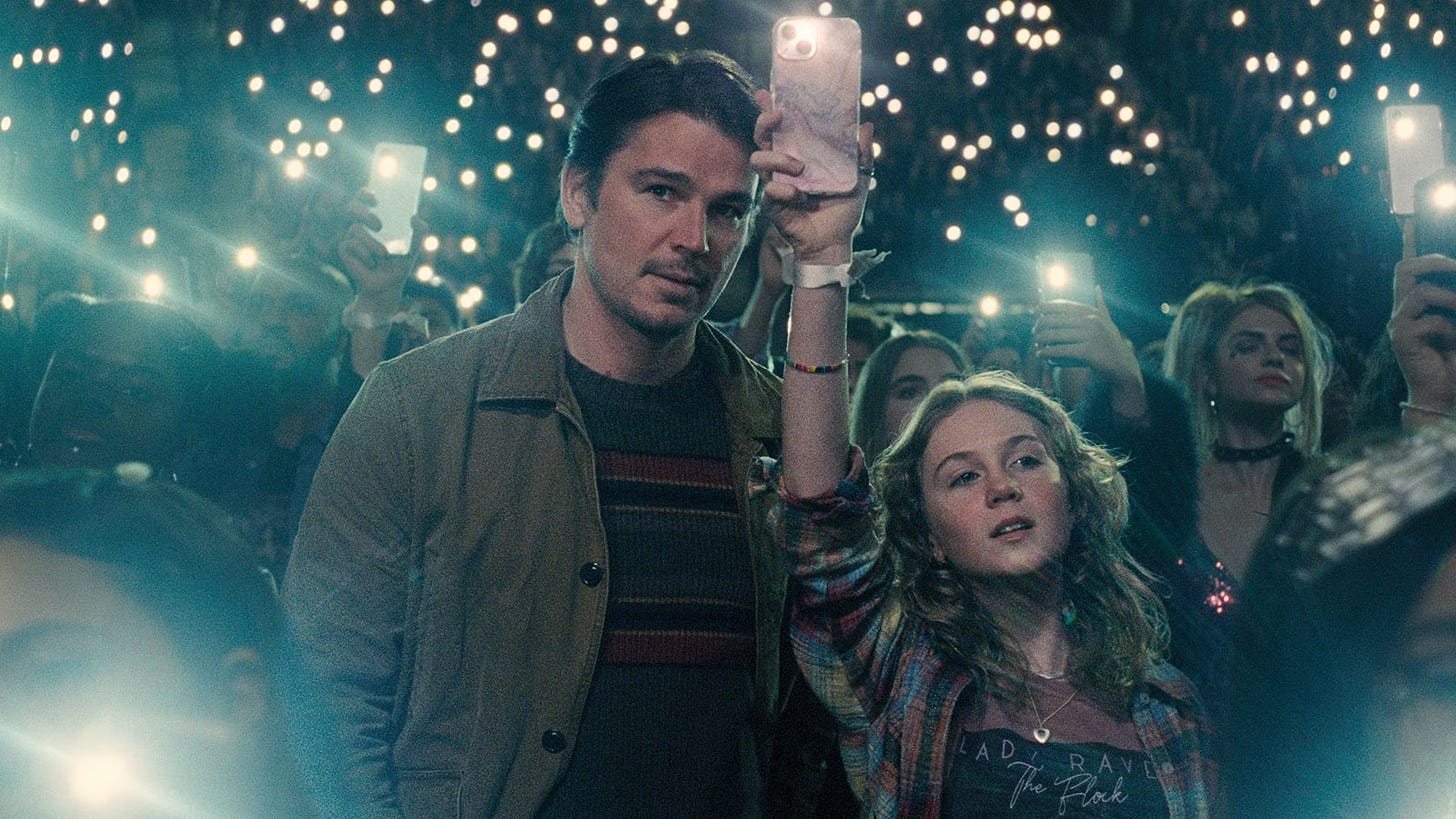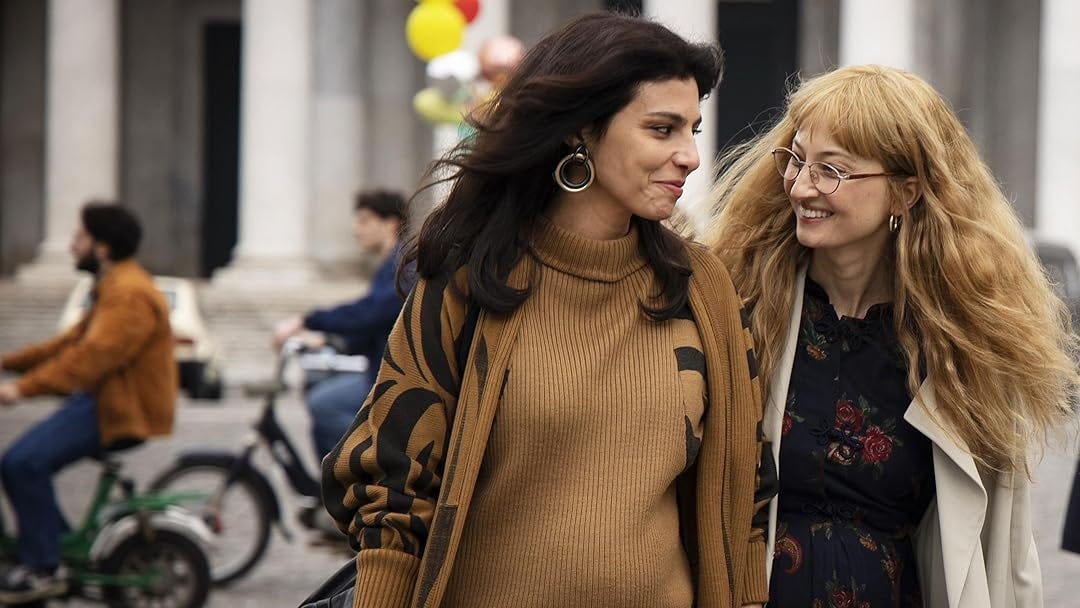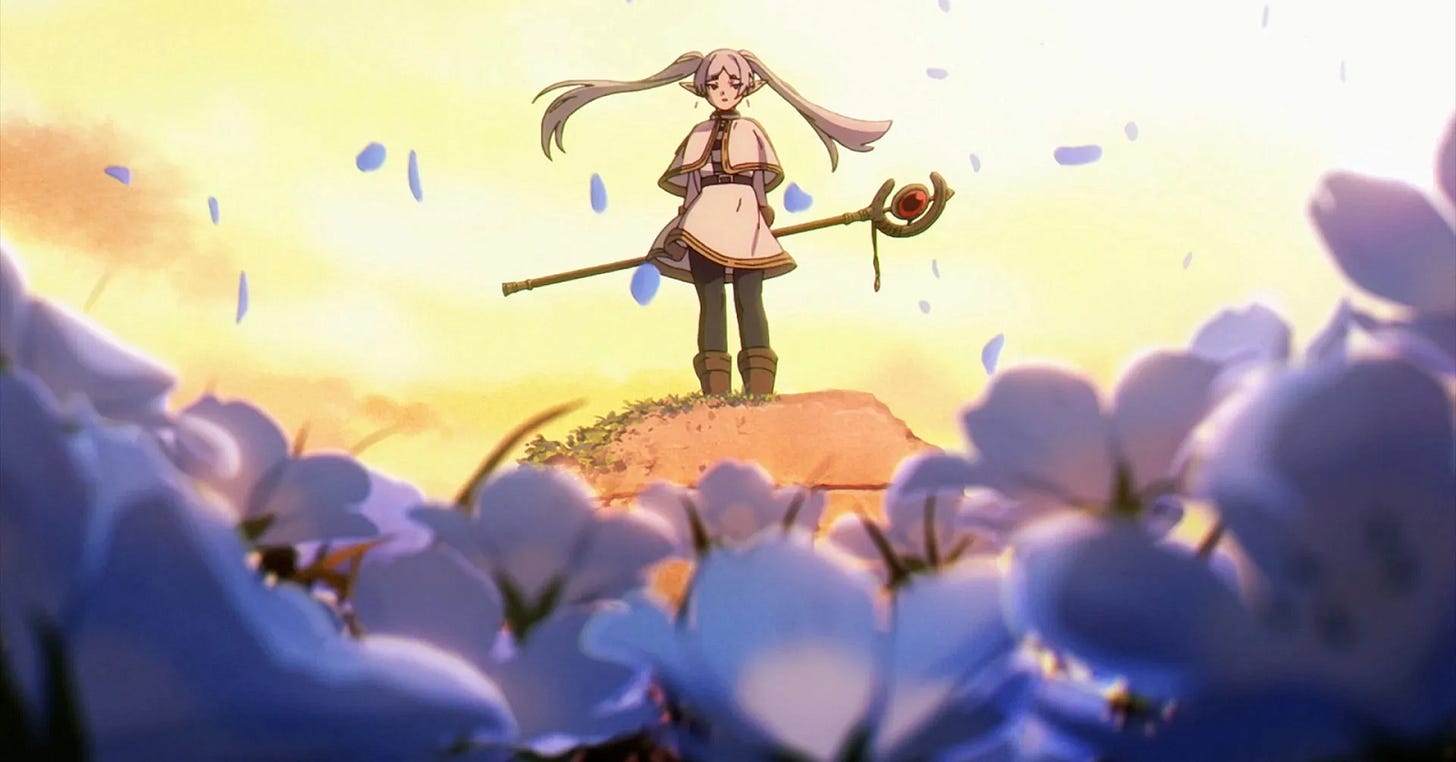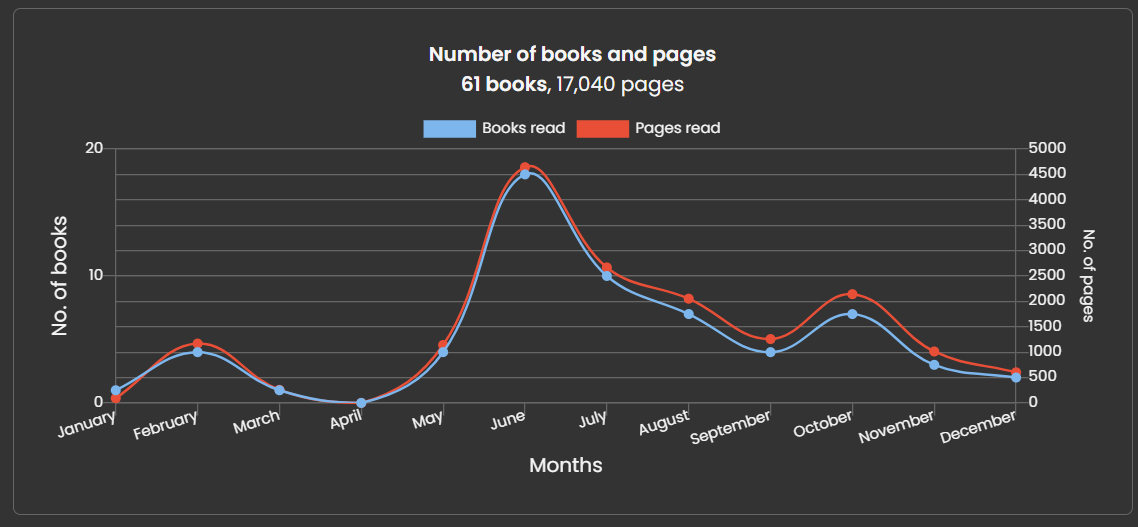Hello readers, Happy New Year! Considering it has been half a year since I experimented with writing consistently here, I thought it would be good to take stock of the media, across different mediums, I have been consuming over the last year.
For me, I think there's a sense of overconsumption. I sometimes fantasize about being in a place wherein I have no access to any of the possibilities of engaging with any of this media. Would life be any lesser? The answer is, of course, no. A year spent looking at the same flowing river outside your cabin is probably just as meaningful as trying to watch a movie a day. Heck, it might be much healthier.
There is a deluge of content online about anti-consumerism habits, to reduce our desires to buy more things, but I wonder if there's an intangible version of this, wherein we reduce our desires to consume more media and more experiences; to stuff our lives and time with an unending series of distractions and entertainment. Maybe sometimes these are distractions from existential doom, or a false goal we create to purpose meaning out of the torrent of content. What drives the desire to see everything, or do everything? What does trying to do everything take away from?
Sometimes I look at my lists of things I want to watch or play or read and get overwhelmed by the number of items. Frequently, I go on little "cull breaks" where I deliberately decide that some things will never be experienced, striking them off my lists, and still at the end of these culls I feel the weight of wanting to do too much.
So if I have any sort of resolution with regard to my media consumption, it is to be even more deliberate with my time and my choices. Maybe the numbers won't fall but at least the time spent on each thing might be more meaningful.
As I put the finishing touches on this piece, I am currently reading bell hooks’ All About Love: New Visions. In it, she draws from Erich Fromm with this quote:
"the principle underlying capitalistic society and the principle of love are incompatible." He contends: "Our society is run by a managerial bureaucracy, by professional politicians; people are motivated by mass suggestion, their aim is producing more and consuming more, as purposes in themselves." The cultural emphasis on endless consumption deflects attention from spiritual hunger.
I think that consumption extends further to the ways in which we engage with media and entertainment today. In hooks’ and Fromm’s view, gluttonous consumption comes from a lack of love received or spirituality, and also takes away from the capacity to extend love to others. Material items and intangible distractions that consume time and money (in my mind the only two quantifiable resources, which are one and the same) are both convenient balm and principal source for lovelessness and spiritual emptiness. It’s making me rethink how I approach media, of which I spent thousands of hours on my life on, and what I actually want to spend those hours on. I cannot help but agree with hooks and Fromm, and feel like there are better ways to engage with and produce art of any sort, where monopolisation of the time and money of others is not the main pursuit. How can films, and everything else, be a locus for building community and expanding love?
Let’s hang on to the overbearing weight of irony as we look at my year of consumption:
Films
Some statistics from my Letterboxd Year in Review
153 diary entries on Letterboxd (around 5 are TV specials/shows)
113 new to me films
Compared to 2023, I managed to more or less match the number of movies seen, and I think I've come to terms with this rate of film watching, which is already substantially higher than the average person, of course. Incredibly, I managed to go beyond 100 films in the cinema this year, a lot of it helped by my time watching films at SGIFF35 (Recap Part 1, Part 2) and three fantastic director retrospectives at the Asian Film Archive (Lee Chang Dong, Yoshimitsu Morita, Edward Yang).
If you look at how I rated new films from 2024, half the time I find myself disappointed, hoping the films were better (3 stars or less). Every year I resolve to watch fewer new releases and every year I end up watching too many. Not to say that this is a waste of time per se, but there's still so much left to see from the decades before, and I'm hoping to tilt my time more toward the past than the present for 2025.
Top 10 Films from 2024 (so far)
No year end list is complete without a top 10 list, so here's mine (correct as of the end of today, possible shake-ups for Deep Cut's annual year in review coming in March):
Look Back
This is not even a feature film. This 59 minute adaptation of Tatsuki Fujimoto's one-shot is precision machined for me. Best friend cinema, isolation, grief, a desire to make art. Thematically, this film homes right into my soul.
No Other Land
This harrowing documentary is one of the most urgent pieces of media of the year. I hope it gets a wider release wherever.
Challengers
Guadagnino's (second) latest is a shot in the arm for cinema. Great performances, fantastic cinematography, pulsing music. Good fucking fun.
A Different Man
Aaron Schimberg's off-kilter exploration of identity, performance, and ego is nuanced and strange. Creating what I feel is a fresh surreal New York tone that I've not really seen for a while. (Feeling shades of Scorsese's After Hours)
Ghostlight
Always teetering on the edge of over-sentimentality, but threading its nearly twee premise expertly, directors Kelly O'Sullivan and Alex Thompson create something affecting, beautiful, and heartwarming. Ranked especially highly for me because I love movies about acting and performance, see A Different Man above as well.
A Monk and the Gun
While my memory of this film has faded somewhat, I remember its perfectly formed screwball bones that prop up its laughs; finding comedy in stacking situations about a monk and a gun. Its Bhutanese setting makes the film feel novel, but its comedic mechanics are universal.
An Unfinished Film
Lou Ye's probably made my favourite Covid film. It's funny how many have become tired watching films set during Covid, but when's the last time the whole world experienced something at the same time like this? I think that thought hopes to forget it happened, but it did happen and we did not come out unscathed, and films like these are needed to help us collectively process it. Even better that it is as life-affirming as An Unfinished Film.
Trap
I'm not a Shyamalan fanboy, but I am here to sing the praises of his tricksy Trap. It's a high wire act to put your villain as your protagonist but Shyamalan plays his game with aplomb, this time making the narrative twist the foundation of his story rather than the final word on it.
Conclave
A late game addition to my top 10, Conclave is pulpy fun. The 12 Angry Men comparison is apt; how do you turn a series of voting and vote-counting into an infectiously engaging affair? Have an all-star cast and catty machinations to power the plot. Takes itself seriously, and still seriously silly: this slaps.
Black Box Diaries
Shiori Ito's personal documentary of her journey bringing the man who raped her to justice feels like essential viewing, just as No Other Land in this list. It captures the journey and its emotional peaks and valleys. Beautifully, Ito finds some joy in the darkness, with her supporters, her allies, her friends, and herself.
Be sure to listen to Deep Cut's 2024 wrap up when it comes out, where some of this list might change as I catch up on some more 2024 releases. Let me know your favourite films from 2024 in the comments below!
Television
If I have any resolution for next year, it is to watch less television (anime not included, I will explain...). I'm sure we can find the statistics of the relatively massive amount of television produced per year compared to yesteryears, but it seems to be the case that television is not quite worth the time in comparison to betting your time on a film. While there were television series I enjoyed this year, very few feel like essential experiences. There has not been more television being produced than now, and yet it is frequently a choice between "good enough" options rather than the high watermark of the so-called "golden age of prestige television" (the late 0000s and early 2010s) in which time spent following a multi-year series was worth the investment. At the time, there were both fewer options, and it was also easier to sift out incredible work that everyone was tuning into together. I am a little sick of good enough. If the attention economy is here to monopolise our time, we need to fight against the glut of good enough.
TV
I watched around 20 different TV series (anime not included) this year. I won't list them all, but here are some honorable mentions: Evil, Doctor Who's return, We Are Lady Parts, Shogun, Fallout, What We Do In The Shadows.
Of these, I'd like to shout out We Are Lady Parts because season 1 and 2 combined are short, hilarious, excellent, and well worth your time. The others are good, but none feel as essential.
The only series I would like to categorically recommend from last year is the Italian HBO series My Brilliant Friend, an adaptation of Elena Ferrante's Neapolitan Quartet, named after its first novel. The adaptation wrapped up this year, turning 4 books into 4 seasons of epic, intimate television. I frequently mention my Best Friend Cinema Canon list on Letterboxd as I collect different films that feel like exemplars of this genre, and I think this series stands very tall in comparison. Ferrante's story portrays friendship as supportive but contentious, with temperatures ranging from warm to scalding. Over four seasons, Lila and Lenu swing wildly within, around, and into each other's orbits. It's a stunning portrait of a friendship, a town, a country, an era.
Anime
Earlier in October I decided to begin learning Japanese in earnest considering I had a "head start" already knowing how to read basic characters from trying to learn it almost 2 decades ago. After completing a formal basic course, my next steps have been to try to learn the language through daily vocabulary/grammar lessons on my own, and more importantly to "immerse" in "native" content. Considering the amount of anime I am already watching, it feels like a good excuse.
If you'd like some recommendations, here are some bangers released last year: Dan Da Dan, Frieren: Journey's End, Delicious in Dungeon, Oshi No Ko.
Books
This year I rediscovered a love for reading. I read more this year than I think in the last 10 years combined (my tracking is a little spotty in some years however). A lot of them land in the realm of personal development (they’re trashy reads mostly) and business books, but I have also been dosing more fiction into the mix (17 in total). I read a total of 61 books, which feels like an absurdly high number for me considering most of them were read from June onwards. You have more time in the day to read than you think.
A nice graph from Storygraph:
I re-read all of Marilynne Robinson's works, one of my favourite authors, which was rewarding. I find I can visualise her characters and worlds more vividly than before, and I wonder why that is.
Of the new-to-me fiction books I read, I'd like to highlight three:
Pachinko – Min Jin Lee
Probably my favourite book that I read this year, Min Jin Lee's book has epic scope, and manages to turn the story of multiple generations of a family into an examination of Korea's history through the times. It's incredible.
Stoner – John Williams
John Williams is my favourite writer discovery this year and Stoner's prose is elegant and sharp. The mundane academic premise of a man, Stoner, living a life, is told with such clarity that its narrative and emotional power feels undeniable.
The Remains of the Day – Kazuo Ishiguro
Kazuo Ishiguro's classic is told with such period detail in its epistolary form that it feels real. It is a narrative of tremendous stealth, about the lies we tell others and ourselves.

Some non-fiction that felt revelatory this year:
Quit – Annie Duke
Annie Duke's book on learning how to decide to quit effectively is an odd recommendation from someone trying to instill more good habits. By reframing my approach to the idea of quitting, it has been one of the more consequential books I've read. It has changed the way I think about the product of effort, and the ways I intend to spend my time and exert that effort. Everything boils down to the value of time, and being able to see the invisible upside of dropping something completely is a valuable skill.
Range – David Epstein
David Epstein's book makes the argument for generalisation over specialisation. In an exploratory year, it helped to validate my desire to try and learn from a more diverse set of experiences. We all need to try more things, and it is through the amalgamation and confluence of our uniquely diverse experiences where creativity lies.
Never Split the Difference – Chris Voss
Chris Voss' book about hostage negotiation is surprisingly useful when laterally applied to how we relate to and communicate with each other. All relationships are negotiations, and Voss gives a toolset for getting what you want, but also to understand that everyone wants something. On the surface it sounds like a selfish goal to only achieve your end of the negotiation, but Voss lays out tactics that chiefly embrace empathy. What we want tangibly is not always related to how we want to feel.
Video Games
I rolled credits on 18 games this year. I rarely play recent releases and am eternally working through a backlog but here's some fun games I played this year.
Balatro
This game is heroin in videogame form. I quit deliberately before becoming fully addicted. I will never touch it again. While there's no actual gambling involved, Balatro manages to create the sensation of pushing your luck and going for "one more pull" until it's suddenly 3 o'clock in the morning. A pinnacle of "eternal" game design. If Microsoft shipped every computer with it instead of Solitaire, the human race would end. They should.
Pikmin 4
Early in the year I got really into Pikmin for the first time with its latest iteration, Pikmin 4. The concept of "dandori" that girds Pikmin will haunt me forever; a Japanese word that can be roughly translated as "the procedure (for carrying out a plan)". Dandori is life. Dandori your life.
Neon White
This indie masterpiece turns every person into a speedrunner. In every level you attempt to get from start to finish in record time. There are shortcuts, and there are shortcuts. Shaving seconds off for a medal is pure adrenaline.
Alan Wake II
Alan Wake II leans into its Lynchian aesthetics and Remedy creates one of the most unique video game narratives and worlds in recent memory. As a game, it's passable mechanically, but it does utilise the medium to tell its story in a way that is not completely possible in something like television. Ironically, I still hope someone adapts it into a movie or television. It feels like a waste to cloister Remedy's world to the realm of video games.
Resident Evil 4 (Remake)
Like playing an action movie, I understand Resident Evil 4's pedigree now. It's fun to be badass Leon Kennedy roundhouse kicking zombies. It's campy and fun.
Chants of Sennaar
One of the more unique indie games I played this year, in Chants of Sennaar you slowly uncover the meanings behind a series of made-up languages to move from one scenario to another. The game tracks as you learn new words and you figure out the class structure of its inhabitants. Fascinating and novel game design.
The Case of Golden Idol / The Rise of the Golden Idol
I played both of these this year, and they're both available with a Netflix subscription. These are deduction style games with grotesque pixel art in which you solve murders and uncover the mysteries behind the titular Golden Idol. Once I started sherlocking my way through the game, I couldn't stop until I cleared each game.
Persona 3 Reload
I'm still working my way through Persona 3, but decided to tackle it after finding Dungeons of Hinterberg to be an engaging experience (I write about Hinterberg here) While it was difficult to find the time to fully commit to Persona's mammoth length, its day/night social calendar structure is moreish and keeps you engaged with small scenes of narrative. While the writing can be a little video-gamey and direct at times, its explorations of grief from the perspective of multiple characters slowly gets its hooks in you.
Music
Quickly, some 2024 album releases I liked this year:
brat – Charli XCX (my top spotify artist)
Charm – Clairo (All of my top 5 songs on Spotify were from this album)
Chromakopia – Tyler, The Creator
GNX – Kendrick Lamar
I Lay Down My Life For You – JPEGMafia
Dark Times – Vince Staples
People Who Aren't There Anymore – Future Islands
Only God Was Above Us – Vampire Weekend
Imaginal Disk – Magdalena Bay
Not listed above, but I got obsessed with Le Sserafim this year, but anyway…
This Newsletter
I came back to the newsletter hoping to publish writing every two weeks, and on average I did achieve that to a certain extent. Including this one, I wrote 12 articles starting at the end of June, which works out to an average of two a month. I guess it feels obvious to note, but writing is difficult! There’s more time spent waiting for ideas to percolate than it is to actually write the damn things. Because I had set out to specifically not write film reviews, it takes a long time to land on an interesting subject to tackle.
The “What I’ve Been Doing Lately” experiment was a nice diversion to shore up my posting frequency, but ultimately felt a little constricting in being a time-bound structure. I rather let the writing dictate itself. Returning to the newsletter was meant to be a way for me to continue exercising my film analytical muscles, and to record how I approach and think about film. Based purely on my ability to keep up a somewhat regular publishing cadence, I’d categorise this return as a success, and I’m hoping to keep it going. Becoming a “producer” instead of merely a consumer pertaining to film does change how you think, and ultimately is more fulfilling.
What's next for The Kinetoscope?
I'll be away in Japan for about a month starting in January so I'll be taking The Kinetoscope on a short hiatus, unless some inspiration strikes me in Japan. Otherwise, I’ll be picking up things again when I return. I’m expecting to publish a piece every 3 weeks as a new goal, but I’m also expecting 2025 to be a little busier on many fronts.
As a writer, 2024 has been a year of establishing good habits to keep the writing going. Letterboxd has been a good outlet for writing quickly about the films I'm seeing, and it is a subtle art to write the most cogent diaristic paragraph for myself. A new habit I have also been cultivating since August has been "morning pages," as described in The Artist's Way (which I've not read). I spend about 30 minutes each morning free writing the first things that come to mind onto paper and it has been great for staving off writer's block and to start the day in the right tone. I'm going to continue it for 2025. Physical pen and paper writing has also been a great tool I’ve reintroduced to my writing practice.
How do I end this column that’s now 3000+ words long? I have no idea! Thanks for reading, and see you later this year!

